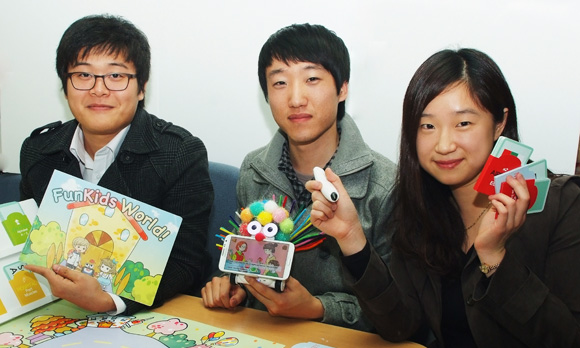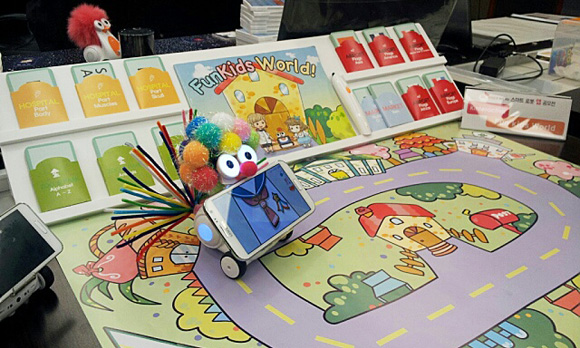Development of English learning app for children using smart robot and smart phone Enhancement of learning effectiveness through environments suitable for users by adjusting to children’s eye-level
A student has developed an application using a smart phone and a robot which young children can more easily learn English.
Kinteractive Team, which is composed of computer application engineering students, won the grand prize (Korean Robot Industry Promotion Principle’s Award) at the Smart Robot App Contest supervised by the Korean Robot Industry Promotion members which ended on February 26th. The winners are Jong Kuk Lim, Dong Seok Yang (3rd Semester of the Computer Application Engineering Master’s course), and Eun Bi Lee (Computer Undergraduate 4th year).

The competition was held in such a way so that they had to produce an app for smart phones using robot Albert, an early childhood education robot made by SK Telecom, which children could learn useful contents. The competition was held since last August, for a total of 7 months, which a total of 125 teams participated, and not only did teams from KAIST, Kwangwoon University etc, and famous national universities related to IT and robots participate, but teams from overseas universities, professional children contents producing companies, IT companies etc also participated and a heated competition was held. Through the 1st and 2nd strict rounds of deliberation, 18 teams were selected, and the ‘Fun kids world’ app created by Kinteractive out of these teams took possession of the first prize and received 20million won. Above this, Sung Hung Jung (Computer Undergraduate 4th year) won silver in the Children’s Safety Education App with his ‘Save the Children’ and received 5 million won as well.
“The team name Kinteractive is a compound word of kids and interactive, and was decided upon from the intention of approaching children with more familiarity through interaction between robot and human instead of making it a unilateral cramming method of education. We endeavored to include these thoughts into the app which we made, (Jong Kuk Lim).”
The app ‘Fun kids world’ which they made uses a smart robot to which children can approach more easily in learning English. There are a range of sites drawn on the map board and when the children select a particular site, the smart robot automatically moves and studies English according to the various situations set in the different sites.
Especially because it is not just a simple memorizing and mainly revising method of English education but rather conversations according to different situations, various games, numerical studies etc, it is an advantage that it enables mixed and integrated studies. As it is made so that one can use numerical cards, country name cards etc, various cards and books, and not use the app, one is enabled to have various fused online and offline experiences. For the English conversations or pronunciations etc, they asked foreign students from Dankook University to make recordings etc and put in their efforts to heighten the completeness of the program.
The interesting part is the fact that it differs to other English learning programs and has applied the concept of keeping a robot. Thus, by using the idea of the avatar fostering game ‘Tamagotchi’ which gained sensational popularity in the old days, it is made so that the children must foster the smart robot by them in order to proceed to the next level.
Through this, they were able to make a leading education with the use of interaction with the robot instead of mainly using a one-way cramming method of learning.

“From the developing stages, we had a lot of thoughts as to ‘how we could make a program set according to children’s eye-level’. Fortunately there was a person from one of the team members who taught English to children, and we were able to gain a lot of help from children and parents. We also had to develop books, maps cards etc, and it wasn’t easy getting a designer, and especially for the robot to automatically move on top of the map, we had to insert a special code, but I remember for the printing we had to re-print over 8 times because it needed special printing. The expenses were also high, of course (Dong Seok Yang).”
Through many trial and errors, the developed app received a lot of good responses from parents and children. A bond of sympathy was received for the fact that the various contents and studying methods were at children’s eye-levels. In actual fact, the app which they developed also received appraisal from the judges that it could be commercialized straight away because the completion was so high.
Currently the app which they have developed is being planned to enter into the commercializing stage with the support from SK Telecom. Out of the prize money which they received, they are planning to donate some (1million won) of it to their juniors for development funds.
“Through developing the app, I have realized the fact that it is not just simple technology, but areas such as engineering, humanity and sociology must be fused together in order to produce good results. We received a lot of help from the guidance professor, Professor Yong Keun Choi since the planning stages, and as much as there were good results from using the knowledge we learned all this time from school, we would like to donate some of the prize money as development funds in hoping that juniors will also study with diligence (Eun Bi Lee).”